The Manifesto
We are a group of fourteen undergraduate students at Bloomsburg University of Pennsylvania, enrolled in an Honors course – Introduction to Digital Humanities. As our final, in fitting with the themes that we have studied, we have been inspired (and, thankfully, allowed and encouraged) to draft, for the 4Humanities project, a manifesto. [See explanation of context for this manifesto on 4Humanities site.]
We believe that teaching Digital Humanities to undergraduate students is critically important. Today’s college undergrads are part of a unique, new generation. We have been immersed in this new climate every day, surrounded by the digitization of the world, and yet most students probably know very little about the actual study of Digital Humanities.
So little is being done to truly integrate technology into new pedagogical practices. Teaching Digital Humanities to undergrads can be beneficial because it gives insight not only into the humanities but also into how the onset of technology has changed our world, and how we can change with it. Though learning Digital Humanities does not need, as a goal, to turn its students into scholars, it can prompt them to make their work a little more worthwhile.
The study of humanities is an art form, and if this is not passed on to the next generation, using the new tools that we are accustomed to and can use easily, the art form will be lost. As one of the few undergraduate DH classes, we feel that all undergraduates need to have a chance to experience this and to show the DH community the substantial contributions that we can make. Teaching DH to undergraduate students opens up a world of innovation that will enhance the study of the humanities.
How could Digital Humanities have evaded us, the digital natives, after two decades of immersing ourselves in not only the humanities, but also technology? Why is the body of work that defines digital humanities made up of pieces written by individuals who are immigrants to this age? We appreciate and respect immigrants’ contributions, but natives bring a critical new perspective – we need to be prepared to take over.
Mark Bauerlein argues that “[Digital immigrants] want [us] to grow up and to blow [them] away […] but [they] just don’t see it happening” (see video from the PBS special, Digital Nation). In the chapter “Screen Time” from his book, The Dumbest Generation, Bauerlein further asserts that much of our time spent with digital media is more of an idle activity than a mind-expanding one. We’ve read and heard enough statistics this semester to know that he’s not just making this up. But what exactly are we doing wrong?
We’d like to argue that we haven’t done anything wrong; we’ve simply been misguided.
Technology can both inhibit and facilitate the learning process for undergraduates. It can serve as a tool for intellectual assignments or as a distraction; the latter of which gave us the title “Dumbest Generation.” If we, the digital natives, don’t want this designation, we need to harness this shift in our learning styles and knowledge. We need to show the digital immigrants that “our way” cannot be compared with the “old way” — it’s simply different.
As a class, DH opened our eyes to these implications of technology. This course exposed us to the effects of the digital world in each of our lives and society in general. We have learned that we are not less intelligent, but that we use knowledge and learn information differently than digital immigrants.
Today, we need collaboration, not lectures; we need to learn concepts, not singular facts; we need networking and socialization, not isolation; we need interactive learning, not to sit back and listen. We need new outcome objectives, not standardized tests. The immigrants ultimately need to accept this change, for the digital natives are fundamentally different.
Because it’s different for everyone. The science major approaches things differently than the literature major — this diversity is foundational to Digital Humanities.
The literary scholar will tell you what Howl means; the historian will give you context on the sociopolitical climate of the time; the chemist will test for drug residue on the original manuscripts; the computer scientist will create a Java-enhanced website; all of them will transcribe those manuscripts in TEI-XML; and none of this will be done alone.
Through our Digital Humanities experience, we’ve learned that Humanities is interdisciplinary and collaborative. To quote our About page: “In this course we’ll explore some of the new ways humanists are bridging the cultural divide by applying technologically-driven methods within the humanities.” Rather than fussing over a definition of DH, why not kick back and embrace its multifarious nature?
It is baffling why the concepts of DH are not being taught more broadly at the undergraduate level. Digital Humanities is about not only learning and accepting the digital ways of our world, but also about how to apply these strategies to our education. From our DH class, we found that DH isn’t easy to pin down/put a label on. It’s not a fact or a definition one can memorize. It’s not something that can be understood in 5 minutes- or even 5 weeks. It’s something that is on a completely different level than any other subject or idea. It’s real. It’s relatable. It’s understandable. It’s intellectual. It’s sophisticated. It’s essential.
If we could take all of these thoughts and ideas from a course we were so unsure of in the beginning, imagine what college students in the future could contribute.

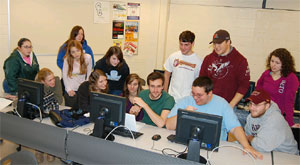
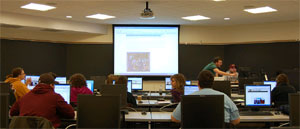
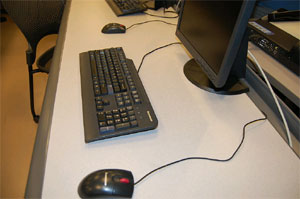
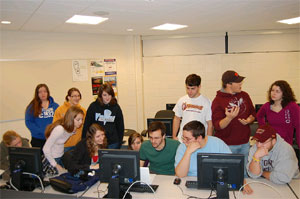
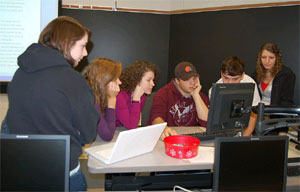
I agree that we can use our technology to optimize our learning experience and make the most of what we have. But at the same time it can be a distraction with a lot of the social media out there. But if we make the learning experience more interactive with our technology I think it is a great way to learn with this new generation.
The article brings up several topics that are indeed interesting. Some of the ideas mentioned in the article were brought up during our class discussions: revolutionizing the way of teaching. By attempting to stray away from the status quo of a typical lecture culture and go through a transitional phase where technology is being incorporated to education sounds enticing. Technology is power and with that power you can access a plethora of opportunities that can expedite your education as well as enable you to collaborate. This is omitted in a lecture environment. Technology, if used correctly, can get rid of isolation and bring in the intangibles that we don’t have any more in most education systems. This includes the purpose of information, concepts, ideas etc. However, just as much as technology can bring us altogether, it can be a distraction. The solution is to simply find a balance and discern for your own benefit.